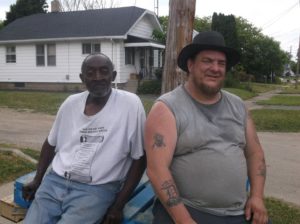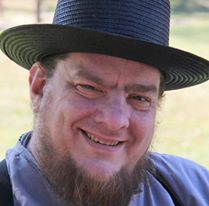If the end-time fallacies of Tim LaHaye have any interpretive value, I propose a compare and contrast exercise with the city of Flint, Michigan. Flint is home to a people that have been “Left Behind.” While LaHaye’s apocalyptic lack of theological imagination is little more than a lie, the opportunity for the church to recognize our error and reorganize into a truly apocalyptic assembly is fully represented in the reality of living in Flint. The Body of Christ has been lost in the violent maladaptive literary world of dragons and super-whores for far too long, failing to recognize our obligation to embody the gospel in a manner that reveals something far more important than the end of the world; that being the rebirth and a restoration of God’s creation to wholeness.
Flint is the place where the sins of unjust economics, whiteness, and electoral politics have come home to roost. In the midst of a water crisis that has had a catastrophic effect on residents of the city and resulted in corporate trauma, the failure of the church is as evident as the failure of the water system. The residents of Flint were left behind to suffer the consequences of state-sponsored sin, when their water was poisoned, and and when this poisoning was denied by authorities. The people of Flint were left behind to suffer the consequences of institutionalized racism. They were left behind by a changing economy that no one prepared them for nor explained to them, despite promising them new jobs and new prosperity every election cycle. The people of Flint were left behind by the very people who promote Heaven as a reward for worldly suffering while reaping the benefits of wealth accumulated in the midst of such suffering. Flint is far more indicative of the end-times than LaHaye fans want to admit – it marks the end of the church as a relevant institution as we know it in the here and now.
I felt a call to return to Flint, the hometown my parents were forced to leave behind when the recession of the late ‘70’s drove us to Detroit so they could find work. When I heard about the water crisis and thought of the biblical call to deny privilege and serve the least of these, I turned a deteriorating job experience into an opportunity for ministry. I made a decision to go to Flint three days a week and contribute resources to the water crisis response. I was welcomed by First Church of the Brethren in Flint to work with their congregation and the African-American congregation they shared the building with, NOW Ministries.

Working with First CoB and Now Ministries, we went from distributing three pallets of bottled water a day to 18 pallets of water a day, three days a week. We also found the resources to provide fresh food to our neighbors, diapers and hygiene products, and provide neighbors with up-to-date information about the water crisis. Along with the work that was being done at the church, we shared with one another our understandings of God and the Bible and talked about what it is that we must do to reflect the love of Christ to our neighbors.
Importantly, the number of folks volunteering allowed for the church to keep its doors open almost every day of the week. As such, the building on Stocker Avenue became much more than a place to pick up water. It became a central location for adults and children alike to experience community. The building’s social significance became evident one night when my 70-year-old water distribution partner B.B. and I were struck with a dilemma. We were the only two folks (left behind) at the church one afternoon, waiting for hours for a water delivery that never came. The state was not sending enough truck drivers to help with water distribution, and deliveries were being held up because the food bank drivers were pressed into double duty. They delivered loads of food to locations around the east side of the state, and then came back to Flint to deliver pallets of water. We received our delivery at 5 pm.
Importantly, the number of folks volunteering allowed for the church to keep its doors open almost every day of the week. As such, the building on Stocker Avenue became much more than a place to pick up water. It became a central location for adults and children alike to experience community. The building’s social significance became evident one night when my 70-year-old water distribution partner B.B. and I were struck with a dilemma. We were the only two folks (left behind) at the church one afternoon, waiting for hours for a water delivery that never came. The state was not sending enough truck drivers to help with water distribution, and deliveries were being held up because the food bank drivers were pressed into double duty. They delivered loads of food to locations around the east side of the state, and then came back to Flint to deliver pallets of water. We received our delivery at 5 pm.Cars were lined up for water, and B.B. and I were having great difficulty keeping up.We were two men over the age of 50, we were wearing down, and our instructions at that time were to not leave water outside. The line of cars grew deeper, and we were exhausting ourselves. As the sun was setting, our neighbors were not unaware of what was happening. First, one teen came over to the church to volunteer help. Then a second. A third came with his sister, who set up a candy and Kool-Aid stand, using bottled water to make the drinks with sugar from her house. It was this evening that we recognized we were making an impact on our block. We had folks from the block, ages eight to nearly 80, distributing water and having fun. Together, we had a purpose.
Cars were lined up for water, and B.B. and I were having great difficulty keeping up.We were two men over the age of 50, we were wearing down, and our instructions at that time were to not leave water outside. The line of cars grew deeper, and we were exhausting ourselves. As the sun was setting, our neighbors were not unaware of what was happening. First, one teen came over to the church to volunteer help. Then a second. A third came with his sister, who set up a candy and Kool-Aid stand, using bottled water to make the drinks with sugar from her house. It was this evening that we recognized we were making an impact on our block. We had folks from the block, ages eight to nearly 80, distributing water and having fun. Together, we had a purpose.
This blog post is part one of a two-part series adapted from a piece originally published on Scot’s personal blog (link below).
 Scot Miller, of Hastings, Michigan (by way of Flint and Detroit), is a passionate and tireless worker for justice – passions that led him to seek degrees in social work. Having been a member the Religious Society of Friends (Quakers) for 15 years, he now serve as Pastor of Education and Outreach for Common Spirit Church of the Brethren in Grand Rapids. Scot spent most of 2016 ministering in Flint, Michigan, as a responder to the water crisis there. He served under the auspices of Common Spirit at First Church of the Brethren in Flint, in the neighborhood of his birth. He served as an adjunct professor of social work at Kuyper College for four years, and more recently served as an adjunct professor at the Earlham School of Religion during the 2017 January intensives. He is particularly drawn to Anabaptist theology as well as apocalyptic expressions of early Quakerism. You can read more of Scot’s work at http://www.gospeloftheabsurd.net/.
Scot Miller, of Hastings, Michigan (by way of Flint and Detroit), is a passionate and tireless worker for justice – passions that led him to seek degrees in social work. Having been a member the Religious Society of Friends (Quakers) for 15 years, he now serve as Pastor of Education and Outreach for Common Spirit Church of the Brethren in Grand Rapids. Scot spent most of 2016 ministering in Flint, Michigan, as a responder to the water crisis there. He served under the auspices of Common Spirit at First Church of the Brethren in Flint, in the neighborhood of his birth. He served as an adjunct professor of social work at Kuyper College for four years, and more recently served as an adjunct professor at the Earlham School of Religion during the 2017 January intensives. He is particularly drawn to Anabaptist theology as well as apocalyptic expressions of early Quakerism. You can read more of Scot’s work at http://www.gospeloftheabsurd.net/.
Photo Credits: Scot Miller

